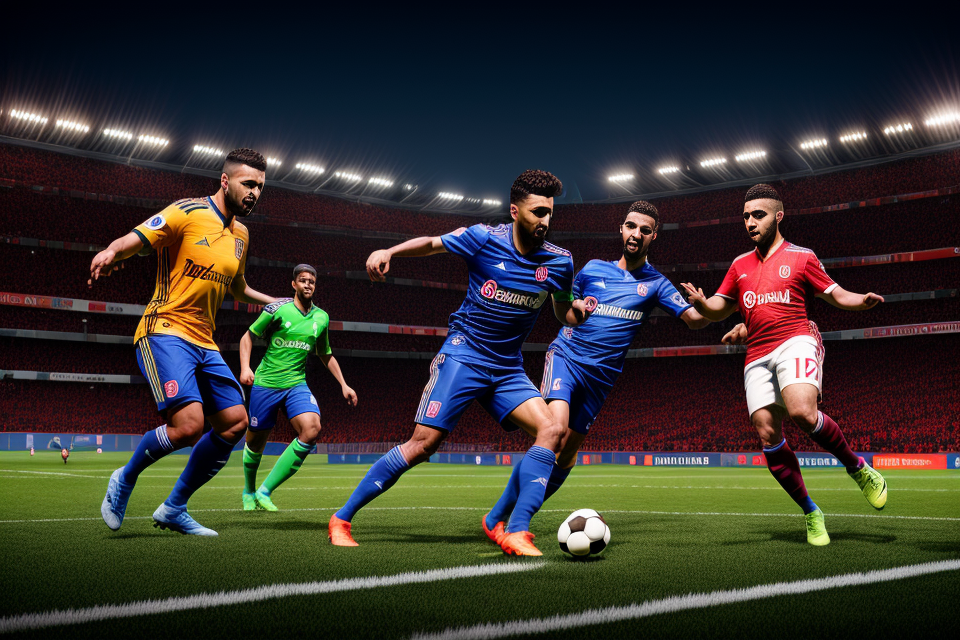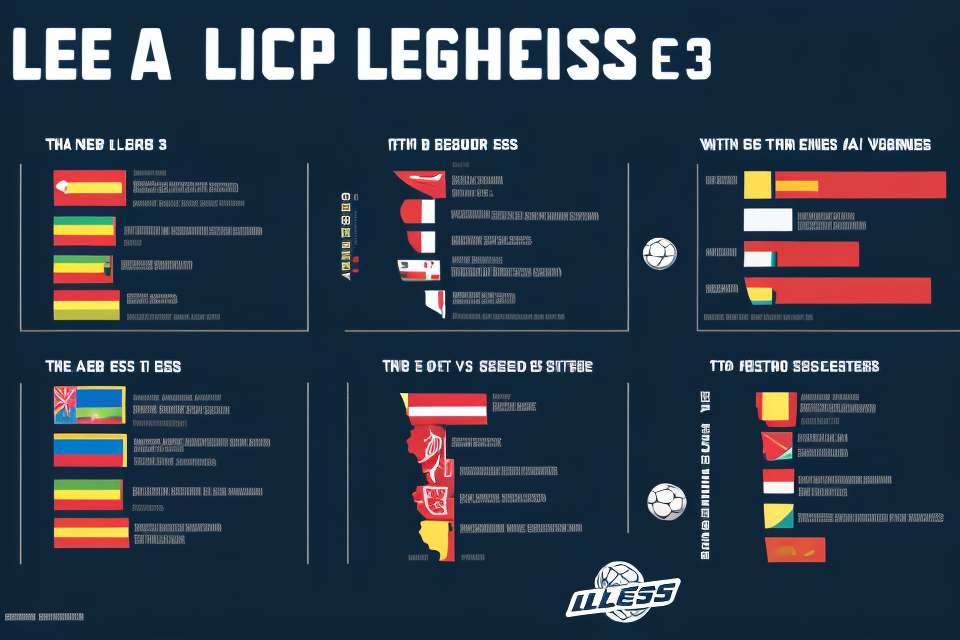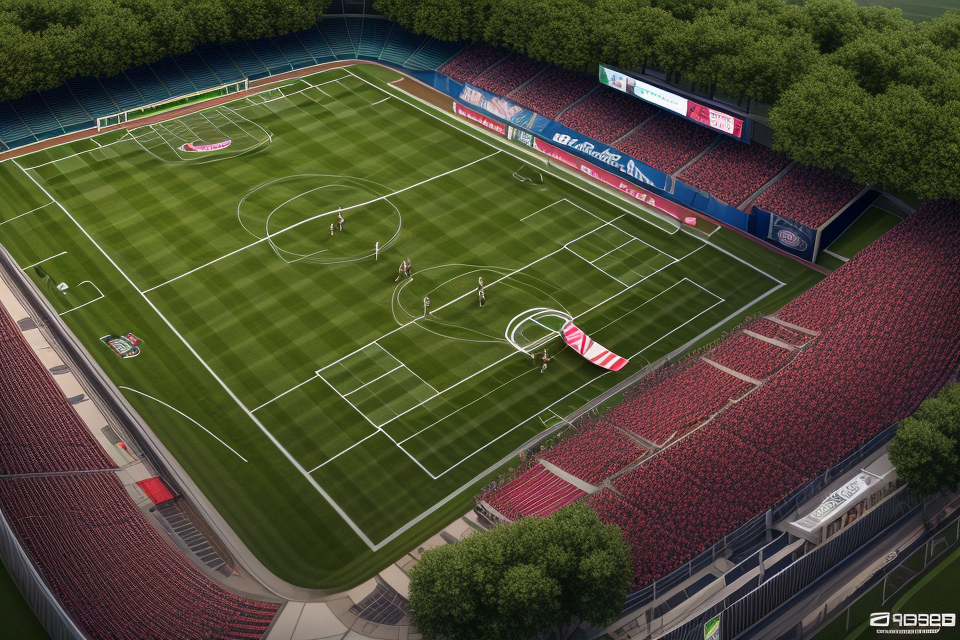The topic of whether Ligue 1, the top-flight soccer league in France, can be considered among the top 5 leagues in the world has been a subject of much debate and discussion. While some argue that the league has produced some of the greatest teams and players in history, others contend that it has struggled to keep up with the elite leagues in Europe. In this article, we will explore both sides of the argument and provide a comprehensive analysis of the issue at hand.
Ligue 1, the top professional football league in France, is often considered one of the top soccer leagues in the world. It boasts a rich history and some of the most successful and popular clubs in Europe, such as Paris Saint-Germain, Lyon, and Marseille. The league is known for its high level of competition and talented players, making it a top destination for football fans and experts alike. While it may not be considered in the top 5 by some, it is certainly in the conversation for one of the best soccer leagues in the world.
The Debate Surrounding Ligue 1’s Status
Criticisms of Ligue 1’s Quality
One of the primary criticisms of Ligue 1’s quality is the poor management of the clubs. Many teams in the league struggle with financial difficulties, which often leads to a lack of investment in the squad. This, in turn, can result in a lack of competitiveness and an imbalance of power between the top teams and the rest of the league.
Another criticism of Ligue 1’s quality is the limited finances available to the clubs. The lack of money available to invest in players and infrastructure can lead to a stagnation in the league, with teams unable to compete with the bigger clubs in Europe. This can result in a lack of competitive matches, which can make the league less appealing to fans and viewers.
Inconsistent performances are also a criticism of Ligue 1’s quality. Due to the lack of investment in the squads, many teams struggle to maintain consistent performances throughout the season. This can lead to a lack of excitement and unpredictability in the league, which can make it less appealing to fans and viewers.
Additionally, the league’s quality can be affected by the inconsistent scheduling of matches. The league’s schedule can be affected by various factors, such as weather and traffic, which can lead to matches being postponed or rescheduled. This can result in a lack of continuity in the league, which can make it less appealing to fans and viewers.
In conclusion, there are several criticisms of Ligue 1’s quality, including poor club management, limited finances, inconsistent performances, and inconsistent scheduling of matches. These factors can impact the league’s competitiveness and appeal to fans and viewers.
Arguments in Favor of Ligue 1’s Top 5 Status
Historically strong teams
One argument in favor of Ligue 1’s top 5 status is the historically strong teams that have come out of France. Clubs like Olympique de Marseille, AS Saint-Étienne, and Olympique Lyonnais have all been successful on the domestic and European stage. Additionally, Paris Saint-Germain has emerged as a powerhouse in recent years, with deep pockets and a roster of world-class players.
Success in European competitions
Another argument in favor of Ligue 1’s top 5 status is the success that French clubs have had in European competitions. Olympique de Marseille won the UEFA Champions League in 1993, while AC Milan and Manchester United were in the same tournament. Additionally, Monaco won the UEFA Cup in 1992, and Bordeaux won the UEFA Cup in 1996. More recently, Paris Saint-Germain reached the UEFA Champions League final in 2020, where they lost to Bayern Munich.
High-quality players
Finally, Ligue 1 has produced some of the best players in the world. Players like Thierry Henry, Zinedine Zidane, and Patrick Vieira all honed their skills in France before going on to have successful careers elsewhere. More recently, players like Kylian Mbappé, Ousmane Dembélé, and Antoine Griezmann have emerged from Ligue 1 and become key players for their respective clubs and national teams. The high-quality players that come out of Ligue 1 are another argument in favor of its top 5 status.
Comparing Ligue 1 to Other Top Soccer Leagues
The “Big 5” Leagues: A Comparison
English Premier League
The English Premier League (EPL) is widely regarded as one of the top soccer leagues in the world. With 20 teams competing each season, the EPL features some of the most renowned clubs in global soccer, including Manchester United, Liverpool, and Chelsea. The league’s popularity is due in part to its high level of competitiveness, as well as its extensive broadcasting and sponsorship deals. The EPL is known for its fast-paced, physical style of play, and has produced some of the world’s most talented players.
La Liga
La Liga, the top professional soccer league in Spain, is another of the “Big 5” leagues. It is home to world-renowned clubs such as Real Madrid and Barcelona, and has a reputation for its technical, possession-based style of play. La Liga boasts a strong fan base and is known for its passionate supporters, who create an electric atmosphere at matches. The league has a long history of producing world-class players and has a strong presence on the international stage.
Serie A
Serie A, the top soccer league in Italy, is one of the oldest and most prestigious leagues in the world. It is home to iconic clubs such as Juventus, AC Milan, and Inter Milan, and is known for its passionate and knowledgeable fans. Serie A is known for its tactical and defensive style of play, and has produced some of the world’s greatest players, including Paolo Maldini and Francesco Totti. The league has a rich history and has been home to many successful teams over the years.
Bundesliga
The Bundesliga, the top professional soccer league in Germany, is known for its fast-paced, attacking style of play. It is home to world-renowned clubs such as Bayern Munich and Borussia Dortmund, and has a strong fan base that creates a lively atmosphere at matches. The league has a reputation for being one of the most competitive in the world, with a high level of parity between its teams. The Bundesliga has produced many successful teams and players over the years, and has a strong presence on the international stage.
Ligue 1
Ligue 1, the top soccer league in France, is the final of the “Big 5” leagues. It is home to renowned clubs such as Paris Saint-Germain and Olympique de Marseille, and has a reputation for its fast-paced, attacking style of play. Ligue 1 has a strong fan base and is known for its passionate supporters, who create a lively atmosphere at matches. The league has a long history of producing world-class players, including Thierry Henry and Zinedine Zidane, and has a strong presence on the international stage. However, Ligue 1 has faced challenges in recent years, including issues with stadium infrastructure and financial stability.
The Case for Ligue 1’s Inclusion in the “Big 5”
Strong fan base
Ligue 1 has a passionate fan base that is dedicated to their respective clubs. The league’s supporters are known for their enthusiasm and love for the game, which creates an electric atmosphere at matches. This passionate fan base has contributed to the growth and popularity of the league, making it a force to be reckoned with in world soccer.
Passionate soccer culture
French soccer culture is steeped in tradition and passion. The country has a rich history in the sport, with legendary clubs like Olympique de Marseille and Paris Saint-Germain leading the way. The league’s passionate soccer culture is evident in the fierce rivalries between clubs, such as the “Classique” between Olympique de Marseille and Olympique Lyonnais, which are among the most intense in the world.
Unique style of play
Ligue 1 is known for its unique style of play, which is characterized by technical skill, tactical acumen, and flair. The league’s clubs often prioritize possession and attacking football, with an emphasis on intricate passing and movement off the ball. This style of play has produced some of the most exciting and entertaining matches in world soccer, making Ligue 1 a must-watch for fans of the beautiful game.
The Future of Ligue 1 and Its Path to Top 5 Status
Potential Challenges and Opportunities
Financial Fair Play Regulations
The financial fair play regulations, introduced by UEFA, aim to prevent clubs from overspending on player wages and transfer fees. This has put pressure on Ligue 1 clubs to balance their finances, which can limit their spending on player transfers and wages. This regulation has created a challenge for Ligue 1 clubs to compete with other top leagues in terms of transfer spending, as they may not have the same financial resources as clubs in other top leagues.
Investment from New Ownership Groups
Investment from new ownership groups can be both a challenge and an opportunity for Ligue 1. On one hand, new ownership groups may bring fresh investment and resources to clubs, helping them to compete at a higher level. However, the influx of new ownership groups can also lead to instability, as clubs may be bought and sold frequently, leading to changes in management and strategy. This can create uncertainty for fans and players, and may make it difficult for clubs to build long-term success.
Player Development and Youth Academies
Player development and youth academies are a crucial aspect of building a successful soccer league. Ligue 1 has a strong tradition of producing world-class players, with many French players going on to play for top clubs around the world. However, in recent years, Ligue 1 has faced challenges in developing and retaining top talent. This is partly due to the popularity of other top leagues, such as the English Premier League and La Liga, which may offer more lucrative contracts and opportunities for young players.
To address this challenge, Ligue 1 clubs have invested in their youth academies and player development programs. This includes partnerships with local clubs and youth organizations, as well as investment in technology and coaching expertise. By focusing on player development, Ligue 1 clubs hope to create a pipeline of talent that will help them compete at the highest level and establish Ligue 1 as a top 5 soccer league.
Strategies for Improving Ligue 1’s Competitiveness
Strengthening domestic league
One key strategy for improving Ligue 1’s competitiveness is to strengthen the domestic league. This can be achieved by implementing measures that encourage more spectators to attend matches, increasing media coverage, and promoting the development of young players. By strengthening the domestic league, Ligue 1 can create a more competitive environment that attracts top talent from around the world.
Attracting top international talent
Another strategy for improving Ligue 1’s competitiveness is to attract top international talent. This can be achieved by offering attractive salaries and contracts, providing better living conditions for players and their families, and creating a more favorable tax environment. By attracting top international talent, Ligue 1 can improve the overall quality of its teams and increase its global appeal.
Enhancing club infrastructure
A third strategy for improving Ligue 1’s competitiveness is to enhance club infrastructure. This can be achieved by investing in new stadiums, training facilities, and technology. By enhancing club infrastructure, Ligue 1 can create a more attractive environment for players, fans, and sponsors. This can help to improve the overall competitiveness of the league and increase its global appeal.
In conclusion, improving Ligue 1’s competitiveness is essential for its path to becoming a top 5 soccer league. By strengthening the domestic league, attracting top international talent, and enhancing club infrastructure, Ligue 1 can create a more competitive and attractive environment for players, fans, and sponsors. This can help to increase its global appeal and establish it as one of the top soccer leagues in the world.
FAQs
1. What is Ligue 1?
Ligue 1 is the top professional football league in France. It is one of the most prestigious football leagues in the world and is known for its high-quality football.
2. Is Ligue 1 considered a top 5 league?
There is no consensus on whether Ligue 1 is considered a top 5 league. Some people consider it to be one of the top leagues in the world due to its high level of competition and the quality of its teams. Others argue that it is not one of the top leagues due to the fact that French teams have not been as successful in European competitions as teams from other leagues.
3. How many teams are in Ligue 1?
There are currently 20 teams in Ligue 1. These teams play each other twice, once at home and once away, for a total of 38 matches per season.
4. What is the history of Ligue 1?
Ligue 1 was first established in 1932 and has since become one of the most prestigious football leagues in the world. Over the years, it has produced some of the greatest football teams and players in history.
5. What is the level of competition in Ligue 1?
The level of competition in Ligue 1 is very high. It is known for its fast-paced and technical style of play, and the teams in the league are among the best in the world. The league is also known for its passionate fans, who create an electric atmosphere at matches.



